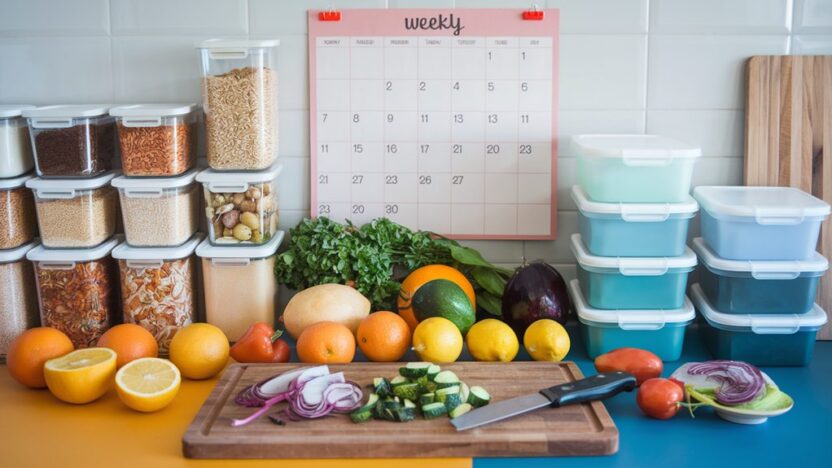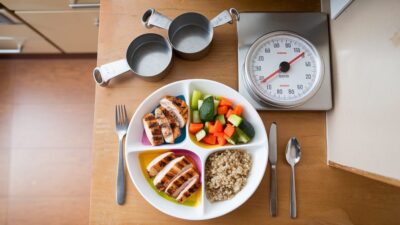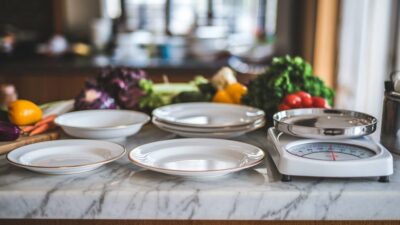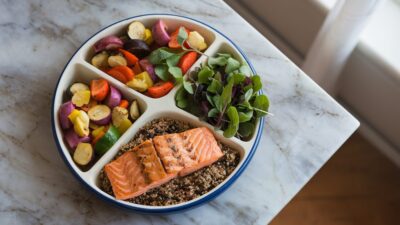Meal planning helps you take control of your nutrition, time, and budget through thoughtful preparation. You'll need essential tools like a calendar, grocery lists, and quality storage containers to get started. Begin by reviewing your schedule, selecting main dishes, and checking your pantry before creating detailed shopping lists. When you're ready to prep, try batch cooking and organizing ingredients efficiently. Store your prepared meals in clearly labeled containers, keeping your refrigerator, freezer, and pantry well-organized with designated zones. With these basics in place, you're on your way to mastering the art of successful meal planning.
Why Start Meal Planning
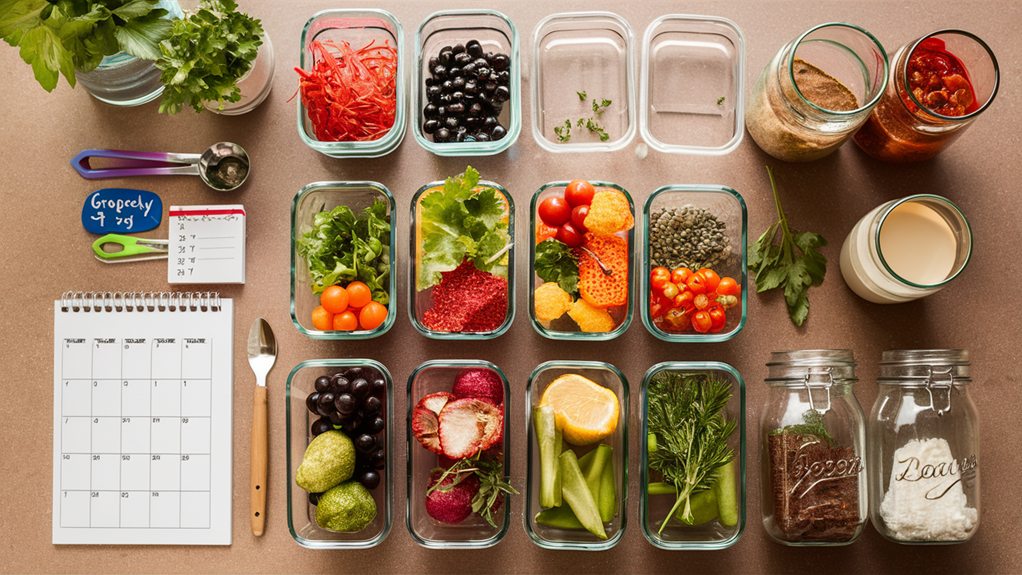
Time management and budget control are two major reasons to start meal planning. When you're juggling work, family, and other responsibilities, having a clear plan for your meals can save you precious hours during the week. You'll spend less time wandering grocery store aisles, making multiple trips, or stressing about what to cook each night.
Additionally, by incorporating balanced meal plans into your weekly routine, you can guarantee that your meals aren't only organized but also nutritious, supporting your weight loss goals.
Meal planning helps you take control of your spending, as you'll shop with purpose and buy only what you need. By planning ahead, you'll reduce food waste and avoid costly takeout orders when you're too tired to think about cooking.
The organization that comes with meal planning also makes meal prep much more manageable, allowing you to portion and prepare ingredients in advance.
Beyond saving time and money, meal planning gives you better control over your nutrition. You can guarantee you're eating balanced meals throughout the week, incorporate more variety into your diet, and make healthier choices.
When you plan your meals, you're less likely to reach for convenient but unhealthy options during busy weeknights.
Essential Meal Planning Tools
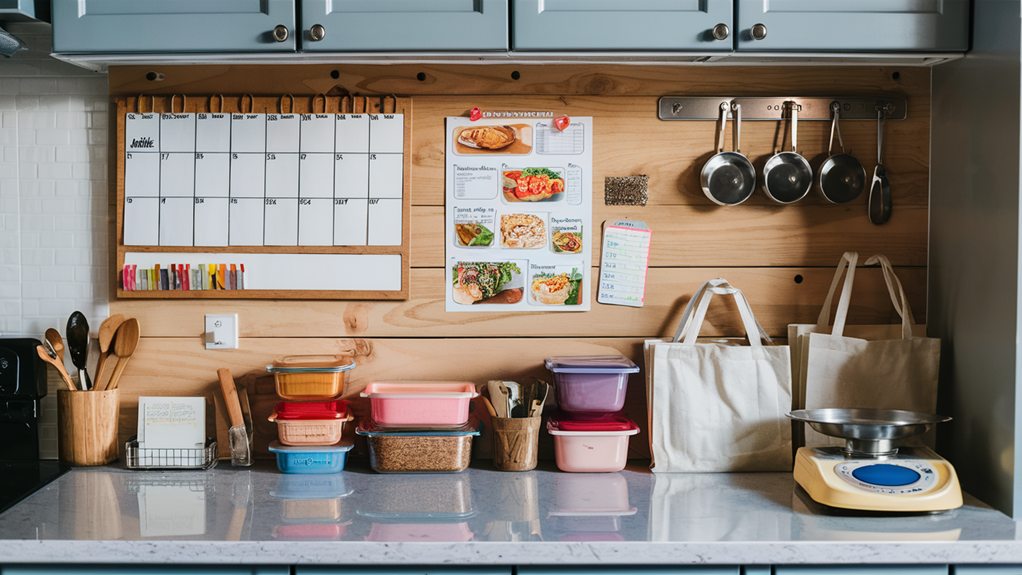
Getting started with meal planning doesn't require fancy equipment, but having the right tools will make the process smoother and more effective. Understanding energy balance is essential when creating your meals, as it helps you choose the right portions and ingredients that align with your weight loss goals.
You'll need a calendar or planner to map out your meals, and many people find that dedicated meal templates help organize their ideas efficiently. A notebook or digital device works perfectly for recording your grocery lists and favorite recipes.
In your kitchen, you'll want measuring cups and spoons for precise portions, along with food storage containers for leftovers and meal prep. A digital kitchen scale can help you portion ingredients accurately, while a set of sharp knives makes food preparation quicker and safer.
Consider investing in a label maker or washable markers to date your stored items.
For digital organization, you might want to explore meal planning apps that can store your recipes, generate shopping lists, and track your pantry inventory. A simple spreadsheet program can also help you track your meal rotation, grocery budget, and family favorites.
Remember to keep basic cooking utensils well-maintained, including cutting boards, mixing bowls, and reliable cookware that'll support your meal planning efforts.
Building Your Weekly Menu
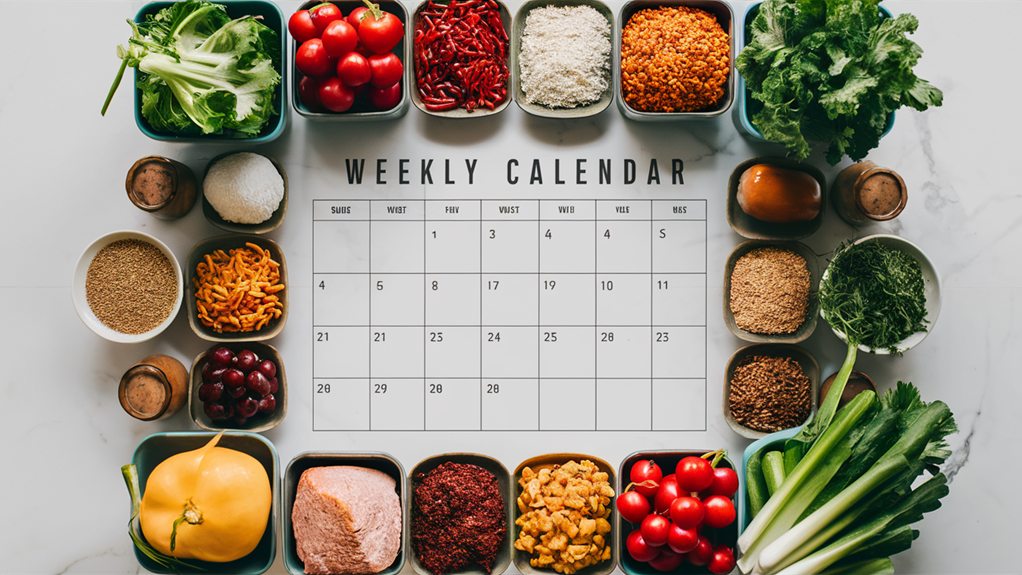
Success in meal planning starts with creating a well-structured weekly menu that fits your lifestyle and nutritional needs. When building your weekly meal plan, start by reviewing your schedule, considering how much time you'll have for cooking each day, and identifying nights when you'll need quick, simple meals. Incorporating balanced meals with a variety of food groups will enhance the nutrition of your plan.
Begin by selecting main dishes for dinner, as these often require the most planning and preparation. You'll want to include a mix of proteins, whole grains, and vegetables, while considering how you can repurpose leftovers for lunches or future dinners.
Next, fill in your breakfast options, keeping in mind that they should be both nutritious and realistic for your morning routine.
As you develop your weekly meal plan, don't forget to account for special dietary needs, food preferences, and your grocery budget. It's helpful to maintain variety by alternating between different protein sources, cooking methods, and cuisine types.
Remember to check your pantry and freezer while planning, as you can build meals around ingredients you already have, reducing waste and saving money.
Smart Grocery Shopping Tips
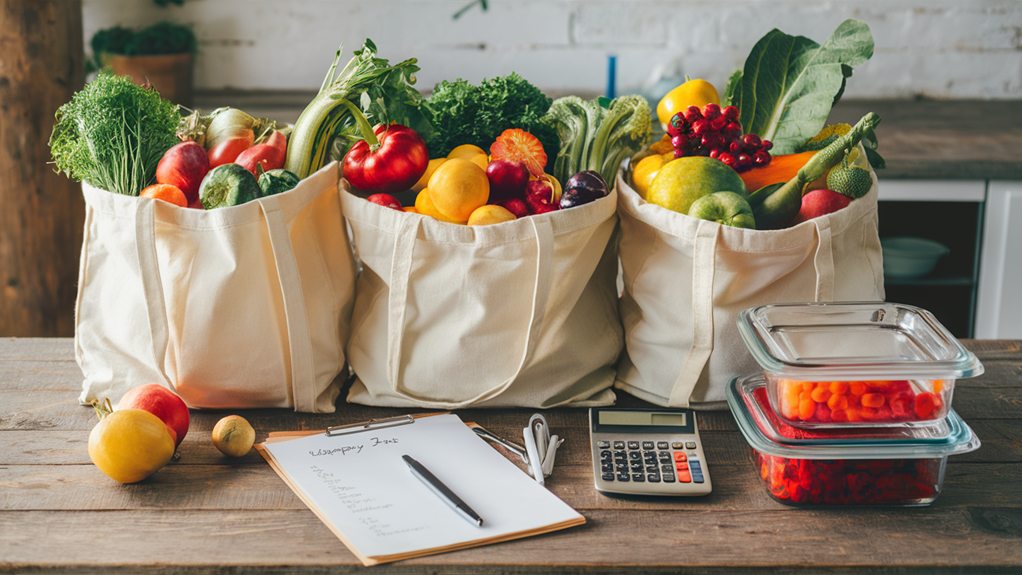
Once you've created your weekly meal plan, efficient grocery shopping becomes your next vital step. A balanced diet relies on the right mix of macronutrients and micronutrients, so it's important to choose fresh, whole foods that support your health goals.
Creating a detailed grocery list helps you stay focused, save money, and avoid those tempting impulse purchases that can derail your budget and meal plan. Start by organizing your grocery list according to your store's layout, grouping items by department like produce, dairy, and pantry staples.
Before heading to the store, check your pantry and refrigerator to avoid buying duplicates of items you already have. When shopping, stick to the store's perimeter first, where you'll find fresh foods like fruits, vegetables, and proteins, before venturing into the center aisles.
Remember to compare unit prices rather than package prices, as larger quantities often provide better value. Shopping during off-peak hours, like early mornings or late evenings, can help you focus better on your list without crowds.
Don't forget to check for sales on items you regularly use, but be careful not to buy things just because they're on sale if they don't fit into your meal plan. By prioritizing essential elements of a balanced diet, you can make sure that your grocery shopping aligns with your health objectives.
Meal Prep Strategies
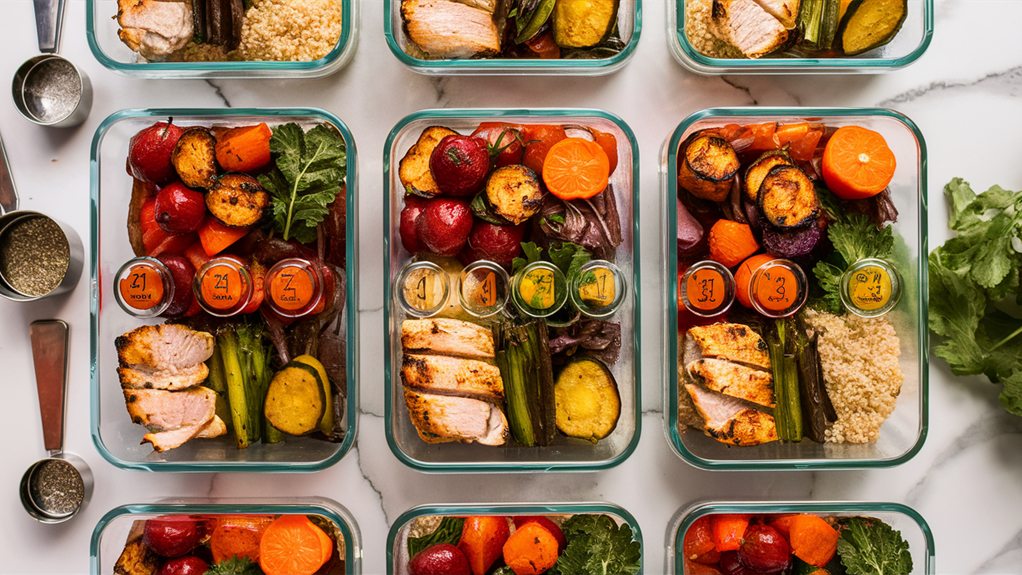
Smart meal preparation transforms your weekly cooking routine from a time-consuming chore into an efficient system. When you're organized and ready to tackle batch cooking, you'll save both time and energy throughout the week.
By dedicating a few hours on your chosen prep day, you'll set yourself up for stress-free meals that are ready when you need them. Incorporating diverse ingredients, such as those found in a Delicious Meal Plans for the Mediterranean Diet, can enhance both flavor and nutrition in your meals.
The key to successful meal prep lies in having a clear strategy and the right tools at hand. You'll want to start by gathering your containers, cutting boards, and essential utensils before diving into the actual preparation work.
Through batch cooking, you can prepare multiple meals simultaneously, maximizing your kitchen time and minimizing cleanup.
Here are three essential meal prep strategies to implement:
- Prep similar ingredients together (chop all vegetables at once, cook all proteins simultaneously)
- Use your oven's multiple racks to roast different items at the same temperature
- Package portions immediately after cooking to maintain freshness and prevent overserving
Remember to label everything with dates and contents, making it easy to grab and go throughout the week. Your future self will thank you for the thoughtful preparation.
Storage and Organization Methods
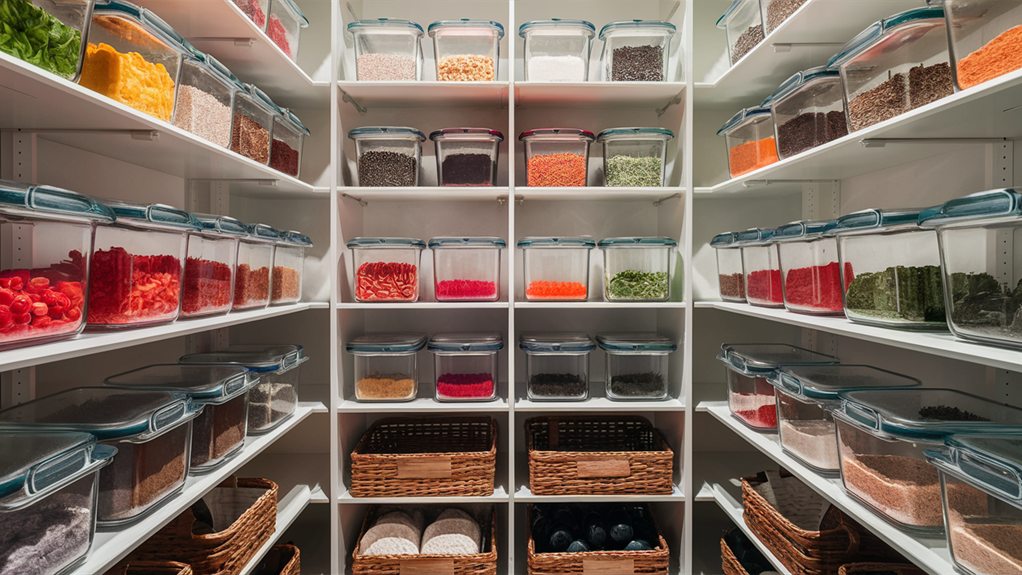
Properly storing and organizing your prepped meals stands at the core of an effective meal planning system. When you've taken the time to prepare balanced meals, you'll want to guarantee they stay fresh and are easy to access throughout the week.
Start by investing in quality, airtight containers that are both microwave and dishwasher safe, making sure they're properly sized for your portions. Implementing strategies for mastering portion control can also enhance your meal planning, helping you manage calorie intake and prevent overeating.
Organize your refrigerator by designating specific zones for different meal components, with breakfast items on one shelf and lunch components on another. You'll find it helpful to use clear containers, which let you quickly identify what's inside, and don't forget to label everything with dates.
For frozen meals, use freezer-safe containers and remove as much air as possible to prevent freezer burn. Your pantry organization matters too, so arrange shelf-stable ingredients by category, keeping frequently used items at eye level.
Consider using drawer organizers, lazy Susans, or clear bins to maximize space and visibility. When you're systematic about storage, you'll waste less food and make your meal planning efforts truly worthwhile.
